
Bessemer is a city in the U.S. state of Michigan. As of the 2020 census, the city population was 1,805. It is the county seat of Gogebic County.
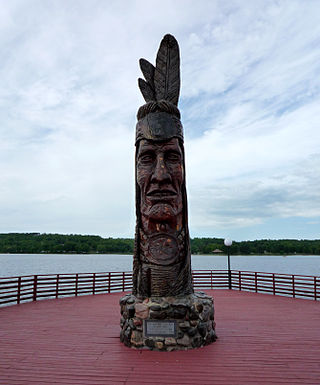
Wakefield is a city in Gogebic County in the U.S. state of Michigan. The population was 1,702 at the 2020 census.

Fielding Harris Yost was an American college football player, coach and athletics administrator. He served as the head football coach at: Ohio Wesleyan University, the University of Nebraska, the University of Kansas, Stanford University, San Jose State University, and the University of Michigan, compiling a coaching career record of 198–35–12. During his 25 seasons as the head football coach at Ann Arbor, Yost's Michigan Wolverines won six national championships, captured ten Big Ten Conference titles, and amassed a record of 165–29–10.

William Martin Heston was an American football player and coach. He played halfback at San Jose State University and the University of Michigan. Heston was the head football coach for Drake University in 1905 and North Carolina College of Agriculture and Mechanic Arts, now North Carolina State University, in 1906. After he retired from coaching, he practiced law and served as a state court judge in Michigan. Heston was elected to the College Football Hall of Fame in 1954. He was selected by the Football Writers Association of America as the halfback for its all-time team for the first 50 years of the sport. University of Michigan coach Fielding H. Yost rated him as the greatest player of all-time.
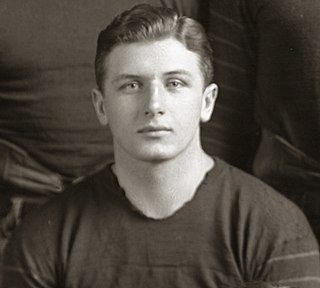
Henry Arthur "Ernie" Vick was an American football and baseball player. He was selected as an All-American center in 1921, played on the 1926 World Series champion St. Louis Cardinals, and was elected to the College Football Hall of Fame in 1983.

The 1901 Michigan Wolverines football team was an American football team that represented the University of Michigan in the Western Conference during the 1901 Western Conference football season. In their first year under head coach Fielding H. Yost, the team compiled a perfect 11–0 record, outscored its opponents by a combined total of 550 to 0, tied with Wisconsin for the Western Conference championship, and defeated Stanford by a 49 to 0 score in the inaugural Rose Bowl game, the first college bowl game ever played. Northwestern (8–2–1) had the best record of a Michigan opponent, however Michigan still managed to win 29-0. The 1901 team was the first of Yost's famed "Point-a-Minute" teams, so named for their high scoring offense. From 1901 to 1905, Yost's Michigan teams compiled a record of 55–1–1 and outscored their opponents by a combined score of 2,821 to 42.
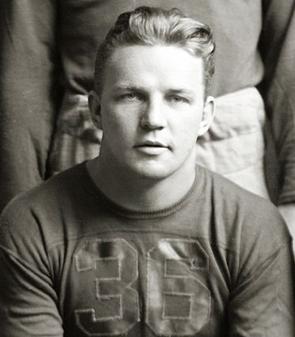
Ralph Isaac "Hike" Heikkinen was an All-American guard for the University of Michigan Wolverines football team from 1936 to 1938. He was a unanimous All-American in 1938, the first player from the Gogebic Range area of Michigan's Upper Peninsula to win the honor. His exploits were widely reported in the Upper Peninsula press, where he became a local hero. He played professional football in the National Football League (NFL) with the Brooklyn Dodgers in 1939.
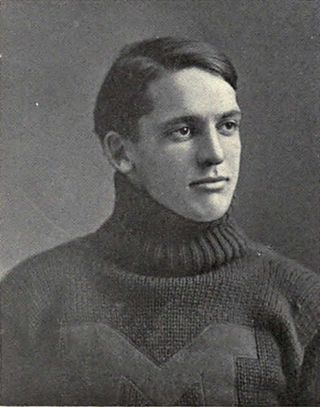
Harrison Samuel "Boss" Weeks Jr. was an American college football player and coach. He played quarterback for the University of Michigan from 1900 to 1902 and served as head football coach at the University of Kansas in 1903 and at Beloit College in Wisconsin in 1904. Weeks was the quarterback and on-field leader of Michigan's national champion "Point-a-Minute" teams that went 22–0 and outscored opponents 1,211 to 12 in 1901 and 1902.

Everett Marlin Sweeley was an American football player and coach. He played fullback, halfback and end for the University of Michigan from 1899 to 1902 and was a member of Fielding H. Yost's 1901 and 1902 "Point-a-Minute" teams. He then served as the head football coach at Morningside College in 1903 and at Washington State University in 1904 and 1905. He also coached basketball and baseball at Washington State. After retiring from football, Sweeley became a lawyer and judge in Idaho.

Ernest John "Aqua" Allmendinger was an American football player and coach. He played college football as a guard for the University of Michigan Wolverines from 1911 to 1913. He was also selected to Walter Camp's All-Service team while serving in the military during World War I.

Albert Ernest Herrnstein was an American football player and coach. He played at the University of Michigan as a halfback and end from 1899 to 1902 and was the head football coach at the Haskell Indian School (1903–1904), Purdue University (1905), and Ohio State University (1906–1909).

The 1900 Michigan Wolverines football team was an American football team that represented the University of Michigan in the 1900 Western Conference football season. In their first and only season under head coach Langdon Lea, the team compiled a 7–2–1 record, finished fourth in the Western Conference, and outscored opponents by a total of 117 to 55. Michigan opened the season with six wins, but went 1–2–1 in the final four games, including losses to Iowa and Chicago.

The 1946 Michigan Wolverines football team represented the University of Michigan in the 1946 Big Nine Conference football season. In their ninth year under head coach was Fritz Crisler, the Wolverines compiled a 6–2–1 record, outscored opponents 233 to 73, and finished the season in second place in the Big Nine Conference and ranked No. 6 in the final 1946 AP poll. The team's two losses came against an undefeated Army team that was ranked No. 2 in the final AP poll and against an Illinois team that won the Big Nine championship and was ranked No. 5 in the final AP poll. Michigan won its last four games by a combined score of 162 to 19, starting a 25-game winning streak that continued for nearly three years until October 8, 1949. In the final game of the 1946 season, Michigan defeated Ohio State, 58–6, the Buckeyes' worst defeat since joining the conference in 1913.
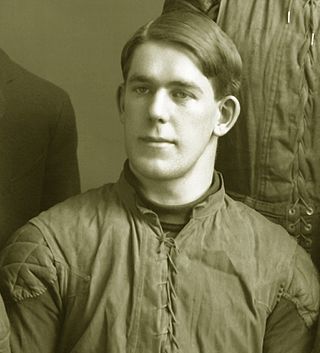
Herbert Spencer Graver Sr. was an American football player, coach, and businessman. He played at the end, halfback, fullback, and quarterback positions for Fielding H. Yost's renowned 1901, 1902 and 1903 "Point-a-Minute" football teams. He scored five touchdowns against Ohio State in 1903, which remains the single-game record for the most touchdowns scored by a player for either team in the history of the Michigan–Ohio State football rivalry. In 1904, Graver was the head coach of the Marietta College football team. He worked for the Graver Tank Company from 1904 to 1954.

Walter White Shaw was an American football player and coach, attorney and businessman. He played at the halfback position for Fielding H. Yost's renowned 1901 "Point-a-Minute" football team. He later worked as an attorney, judge and businessman in Oklahoma and Louisiana.

Reuben W. Kelto was an American football player. He played at the tackle position for the University of Michigan from 1939 to 1941. He was chosen as the Most Valuable Player on the 1941 Michigan Wolverines football team.

George W. "Dad" Gregory was an American football player, coach and lawyer. He was the starting center for the University of Michigan's "Point-a-Minute" football teams of 1901, 1902 and 1903. He was the only player to start all 22 games for the 1901 and 1902 teams that compiled a record of 22-0 and outscored opponents 1,194 to 12. Michigan's football team was recognized as national champions for each of the three years in which Gregory was the starting center. After receiving his law degree from Michigan, Gregory moved to Seattle, Washington, where he was one of the founders of the Karr & Gregory law firm. He also served as the head football coach at Kenyon College during the 1905 football season.

The History of Michigan Wolverines football in the Yost era covers the period from the hiring of Fielding H. Yost as head coach in 1901 through Yost's firing of Tad Wieman as head coach after the 1928 season. The era includes the brief head coaching tenures of George Little and Tad Wieman. Wieman was head coach during the 1927 and 1928 seasons but contended that he had never truly been allowed to take control of the team with Yost remaining as an assistant coach and athletic director.
The 1900 Stanford Cardinal football team represented Stanford University in the 1900 college football season. In their first and only season under head coach Fielding H. Yost, the team compiled a 7–2 record, shut out seven of nine opponents, scored 154 points, and allowed 20 points by opponents. The team registered three shutouts against the Reliance Club, two shutouts against California State Normal School, now known as San Jose State University, and single game shutouts against Oregon and California. The team's two losses came against Nevada (0–6) and a Stanford alumni team (0–14) that featured coach Yost playing at the fullback position.
Richard Anthony "Rick" Sofio was an American politician and teacher.


















